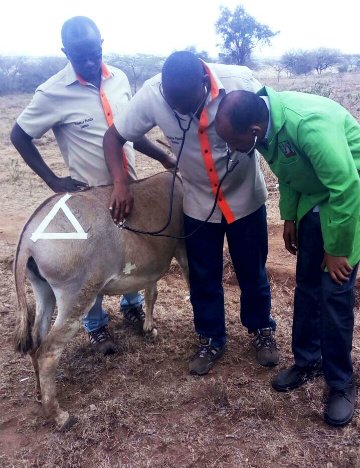Innovation Fund for South Sudan
As part of Brooke's Innovation Fund, we have launched a new partnership in South Sudan where an estimated 100,000 horses and donkeys support people’s livelihoods.
Brooke will be introducing the first equine welfare programme in the country, through Brooke East Africa in partnership with Vétérinaires Sans Frontières Suisse (VSF). The Innovation Fund was created to support pilot projects like this which aim to find innovative new ways of working to further extend our reach to those animals most in need.
In July 2011, after many years of conflict, South Sudan gained independence from Sudan, following a 2005 agreement that ended Africa’s longest running civil war. It remains the youngest country in the world. As a result of this prolonged conflict and disruption to previous government or civil society structures, the country has very few private or state sponsored equine services and limited veterinary training with an equine curriculum.
Equines in South Sudan therefore face enormous suffering. Their owners have immense challenges such as poor access to water, pasture and veterinary services, or simply the knowledge needed to maintain good welfare. On top of this, there is ongoing conflict and security risks.

The Innovation Fund sought to find a way to work ‘long distance’ to address the grave welfare issues faced by working equines, and so Brooke has funded a project to train South Sudanese livestock officers in handling and basic donkey husbandry.
Dr Martin Barassa, Country Director of VSF-Suisse working in Sudan, said: "The equines in South Sudan need urgent intervention, the best way for us to approach a country torn by chronic conflict is via community based networks and respond to the welfare concerns of an estimated 100,000 equine population.
“The pilot project, made possible by Brooke UK, has laid the foundation for sustainable change to the lives of working horses, donkeys and mules in South Sudan. There are great welfare challenges we need to tackle, and I’m looking forward to rolling out campaigns country wide. Government representatives at both national and state levels have welcomed this initiative, so I have high hopes for success!”
In February VSF staff flew to Kenya to join Brooke East Africa’s veterinary team for equine handling and welfare training. They can now return to South Sudan and train other Livestock officers and Community Based Animal Health Workers, who already raise awareness of good welfare practices. Now community education can include simple welfare messages around care and handling that can make a huge immediate difference to working donkeys in the region.
This develops upon VSF’s existing role in South Sudan where they have made significant progress with supporting community based animal healthcare systems, but equines were not included in these. The community engagement and equine welfare messages will also focus on women, after research identified the important relationships between equines and working women. This matches Brooke’s previous findings, that domestic working animals are an enormous asset to women in particular, providing vital support in transportation of water, goods to market and sick relatives to hospital.
Brooke UK and Brooke East Africa will track the progress of this project, which is the first of its kind in the country. It will present an opportunity to improve local knowledge and skills in equine welfare, and help Brooke to see if bringing people from bordering countries to our regional offices for training is a good way to reach ‘the unreachable’.
Dr Martin Barassa said: "We hope the involvement of communities and government ministries in this programme will raise awareness and possibly attract more funding opportunities in addressing equine welfare, health and management.
The main issues are poor knowledge and practices amongst the equine owners and handlers. It’s going to be a challenge to change behaviours, but working with people on the ground is the best way to improve animal welfare.
VSF will also work closely with Brooke to develop training manuals and practical courses on equine welfare and health management.
These will help people make positive changes in addressing the welfare of equines in a practical way. Owners, users, local leaders and other animal welfare groups will then be the promoters and trainers of equine welfare and services in South Sudan, spreading messages further and for long after the project ends in a year’s time.
At a higher level, government ministries will also help make sure the services are delivered, including marking key world events showcasing and advocating for the needs of working horses, donkeys and mules.
"We are looking forward to working closely with VSF on this project and seeing the change we can bring to the communities in South Sudan," said Felix Holman, Innovation Manager at Brooke.
